











. | |
How YOU Can Help
|
The hemlocks are a valuable natural resource, and
they desperately need your help. Whether you are young or not so young,
own property in the mountains or just enjoy visiting them, every effort by every
individual is important. There are many interesting and rewarding ways to
get involved – a lot or a little – whatever works best for you.
See our Schedule of Events
for a variety of opportunities.
|
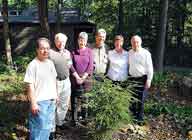
Friends
planting hemlocks on their church campus |
All kinds of volunteers
are needed to work on hemlock treatment, sapling rescue, and hemlock restoration projects, staff our booth at fairs
and festivals,
and help with special programs.
And we always welcome individuals who may have an
interest in joining as a general volunteer or a Facilitator.
Please
contact us on the Hemlock Help Line 706-429-8010 to let us know and learn how
you can help. Thanks!
|

 Support
SGH's mission by becoming a member.
Save Georgia's Hemlocks is a 501(c)(3) nonprofit organization, so the support of
individual members and interested groups is vitally important to us as we work
to identify the hemlock-related needs in each community, find more creative ways
to communicate the hemlock message, develop effective programs to help property
owners save their trees, and expand our capabilities through networking with
individuals and groups that share similar environmental, conservation, and
recreational interests. If you'd like to take a stand, have a say, and be
part of the solution, please visit the
Membership-Donation
page. On that page you'll also find information about several kinds of
special gifts you might be interested in, and not all of them involve money! Support
SGH's mission by becoming a member.
Save Georgia's Hemlocks is a 501(c)(3) nonprofit organization, so the support of
individual members and interested groups is vitally important to us as we work
to identify the hemlock-related needs in each community, find more creative ways
to communicate the hemlock message, develop effective programs to help property
owners save their trees, and expand our capabilities through networking with
individuals and groups that share similar environmental, conservation, and
recreational interests. If you'd like to take a stand, have a say, and be
part of the solution, please visit the
Membership-Donation
page. On that page you'll also find information about several kinds of
special gifts you might be interested in, and not all of them involve money!
Share your talents with
SGH. We are always on the lookout for very special
people to serve in our organization. We are currently seeking:
•
Officer - Facilitator Training Instructor to conduct classes in person
•
Officer - Recording Secretary to
record proceedings of our quarterly Leadership Team meetings
•
Lead Facilitators in the following
counties -- Dawson and Lumpkin, Hall, White and Habersham

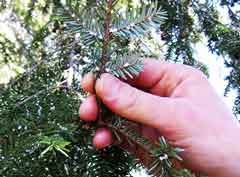 Take care of your own
hemlocks.
Be alert for the first signs of the woolly adelgid -- little white egg sacs on
the underside of the branches. If even one of the hemlocks on your
property is infested or if a neighbor's trees are infested, go ahead and plan to
treat all your hemlocks that you want to save as soon as possible.
Visit the HWA Controls page to learn about
your options or call the Hemlock Help Line 706-429-8010 for advice. Take care of your own
hemlocks.
Be alert for the first signs of the woolly adelgid -- little white egg sacs on
the underside of the branches. If even one of the hemlocks on your
property is infested or if a neighbor's trees are infested, go ahead and plan to
treat all your hemlocks that you want to save as soon as possible.
Visit the HWA Controls page to learn about
your options or call the Hemlock Help Line 706-429-8010 for advice.
Please take action
early!
 And
spread the word to
others.
Believe it or not, there are still many people who are unaware that the hemlocks
are in great danger or may be laboring under misinformation that it's too
expensive or too late to save them. Please be an ambassador for the
hemlocks, using email lists, newsletters, web sites, other social media, and
word of mouth to share the hemlock message. Your friends and business
associates, neighborhood associations and conservation/recreation organizations,
schools and churches, and other community groups need to know. Our
Resources page has a great deal of good
educational materials you're welcome to download and share with others. And
spread the word to
others.
Believe it or not, there are still many people who are unaware that the hemlocks
are in great danger or may be laboring under misinformation that it's too
expensive or too late to save them. Please be an ambassador for the
hemlocks, using email lists, newsletters, web sites, other social media, and
word of mouth to share the hemlock message. Your friends and business
associates, neighborhood associations and conservation/recreation organizations,
schools and churches, and other community groups need to know. Our
Resources page has a great deal of good
educational materials you're welcome to download and share with others.
Here are the three
key messages:
•
The hemlocks are
extremely valuable to the beauty, environmental health, and economic vitality of
our mountain communities, but they're in
trouble and most of them will die unless effective action is taken soon.
•
Property owners can
save as many of their hemlocks as they choose. It's safe, economical,
highly effective, and easy enough for most individuals to do .
•
Save Georgia's
Hemlocks can provide a great deal of free, practical assistance.

Become an active
volunteer.
Save Georgia's Hemlocks is a volunteer organization, so everything
we're able to accomplish is through our wonderful volunteers who share their
time, energy, creativity, and good old-fashioned hands-on action. There are so many different ways to help. You can check the
Schedule of Events page to see when
activities are happening that you might want to participate in. Then
email us or call the Hemlock Help Line 706-429-8010 to let us know of your
interests.
|
•
Teaching or giving presentations
•
Talking to kids' classes or groups
•
Being a neighborhood volunteer
•
Helping on charitable service projects
•
Organizing volunteers for a project
•
Monitoring hemlocks for HWA
•
Measuring, tagging, or treating hemlocks
•
Planting or transplanting hemlocks
•
Leading a hike in the forest
•
Hosting a special event
•
Helping to organize or lead a meeting |
•
Staffing an information booth
•
Preparing marketing and communications
materials
•
Doing research and citizen science
•
Writing articles or educational materials
•
Using your artistic or creative talents
•
Taking photos or preparing YouTube videos
•
Using the Internet, Facebook,
and other technology
•
Distributing educational/awareness
materials
•
Building partnerships with other
nonprofit groups
•
Using your business skills or knowledge
•
Fundraising and/or grant writing
|
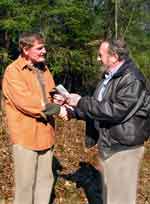 Become a Facilitator.
You can provide an even more valuable service to your community by taking a
short training course (5 hours plus some hands-on practice) to acquire in-depth
knowledge about
the hemlocks, the woolly adelgids, and the available treatments and then making
yourself available to help your neighbors understand the issues and advise them
about appropriate solutions.
Facilitators
are trained in assessing HWA problems, explaining the control methods and
options for getting the work done, setting property owners’ expectations, and
helping property owners implement their chosen solution. Become a Facilitator.
You can provide an even more valuable service to your community by taking a
short training course (5 hours plus some hands-on practice) to acquire in-depth
knowledge about
the hemlocks, the woolly adelgids, and the available treatments and then making
yourself available to help your neighbors understand the issues and advise them
about appropriate solutions.
Facilitators
are trained in assessing HWA problems, explaining the control methods and
options for getting the work done, setting property owners’ expectations, and
helping property owners implement their chosen solution.
They also play a
valuable role in proactively spreading the word about the HWA problem and
available solutions, participating in educational events and charitable service
projects, communicating information between the SGH leadership team and the
community, and serving as good-will ambassadors for the hemlocks and SGH.
To see what's involved, please visit the
Volunteer Facilitator
page.>

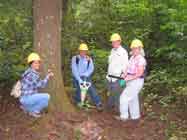 Help hemlocks
on our public lands. In addition to
helping property owners save trees on private land, SGH is very active in
support of our public land managers' efforts to
preserve the trees on public land. Volunteers can participate in joint
SGH projects with the U. S. Forest Service or the Georgia Department of Natural
Resources to treat hemlocks on the national forest, state parks and wildlife
management areas. Or you can volunteer directly with the public land
managers to help hemlocks in other ways, such as monitoring tree conditions,
scouting for survivor trees, or helping to maintain trails and waterways. Help hemlocks
on our public lands. In addition to
helping property owners save trees on private land, SGH is very active in
support of our public land managers' efforts to
preserve the trees on public land. Volunteers can participate in joint
SGH projects with the U. S. Forest Service or the Georgia Department of Natural
Resources to treat hemlocks on the national forest, state parks and wildlife
management areas. Or you can volunteer directly with the public land
managers to help hemlocks in other ways, such as monitoring tree conditions,
scouting for survivor trees, or helping to maintain trails and waterways.
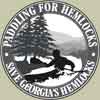 Join
a Paddling for Hemlocks outing. Thousands of hemlocks
growing along Georgia’s river corridors are infested with HWA, and while some
trees are already dead or dying, many are still healthy enough to be treated and
saved. The loss of these hemlocks could have serious results — warmer
water temperature negative impacting fish populations, greater risk of forest
fire endangering our public lands and nearby communities, and more trees falling
into the rivers creating strainers and making them less safe for paddlers,
fishermen, and others who enjoy recreation on our
waterways. Join
a Paddling for Hemlocks outing. Thousands of hemlocks
growing along Georgia’s river corridors are infested with HWA, and while some
trees are already dead or dying, many are still healthy enough to be treated and
saved. The loss of these hemlocks could have serious results — warmer
water temperature negative impacting fish populations, greater risk of forest
fire endangering our public lands and nearby communities, and more trees falling
into the rivers creating strainers and making them less safe for paddlers,
fishermen, and others who enjoy recreation on our
waterways.
Based on these
concerns SGH, in partnership with the Georgia Canoeing Association (GCA) and the
Georgia Department of Natural Resources (DNR) and with the benefit of mentoring
by Asheville-based Hemlock Restoration Initiative (HRI) and Paddlers for Hemlock
Health Action Taskforce (PHHAT), has launched a new initiative called Paddling
for Hemlocks.
The mission is to preserve the health of hemlocks in the riparian corridor of
the Cartecay and other north Georgia rivers, utilizing the ability of
experienced whitewater paddlers to access groves that are not readily accessible
by land. Under the leadership of SGH’s Dave Teffeteller, GCA’s Dan
MacIntyre, and PHHAT’s Alex Harvey, we began recruiting and training in January
and February and held our first treatment outing on the Cartecay River in
Ellijay. For the present, treatment will be only on DNR land where
permission is given.
In the March 2020
GCA Eddy Line,
Dan MacIntyre wrote, “The hemlocks are considered by most paddlers to be the
most beautiful trees on the river.” After enumerating their many benefits,
he went on to say, “Without our hemlocks, Georgia’s rivers and river banks will
not be the same.”
Read Dan’s full
article. For more information, contact
Dave Teffeteller or
Dan MacIntyre. We hope you'll
come out and join us!

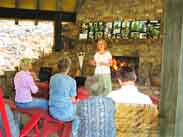 Sponsor a
hemlock presentation.
Sponsoring an educational event just means helping to publicize it, inviting
people to attend, and maybe providing some light refreshments -- no money
involved. So if you have a group that would be interested in having a
hemlock help presentation, we'll be happy to do it and give public recognition
to you or your organization as a sponsor. Call the Hemlock Help Line
706-429-8010 for more information. Sponsor a
hemlock presentation.
Sponsoring an educational event just means helping to publicize it, inviting
people to attend, and maybe providing some light refreshments -- no money
involved. So if you have a group that would be interested in having a
hemlock help presentation, we'll be happy to do it and give public recognition
to you or your organization as a sponsor. Call the Hemlock Help Line
706-429-8010 for more information.
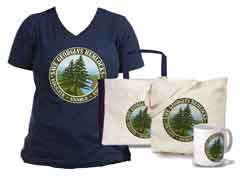 Another
way to help
spread the word is by wearing or using SGH-logo items such as tee-shirts,
tote bags, caps and coffee mugs. We don't receive any money from these
purchases, but they do help raise visibility for the hemlock cause and our
organization, and they're very good looking Another
way to help
spread the word is by wearing or using SGH-logo items such as tee-shirts,
tote bags, caps and coffee mugs. We don't receive any money from these
purchases, but they do help raise visibility for the hemlock cause and our
organization, and they're very good looking
Here's the link:
http://www.cafepress.com/savegeorgiashemlocks.
Help develop a
neighborhood hemlock health plan. Work with your friends and neighbors to develop a neighborhood hemlock help planto suppress the woolly adelgid over the widest possible area. SGH can meet
with your property owners association or its board to provide guidance on
scoping a project, determining the best treatment option, estimating the effort
and cost, anticipating the challenges, and building community support.
Then we can carry it
further to organize a group project, enlisting your friends, neighbors and other
volunteers to treat the hemlocks in your community. We provide the
training and on-site project management and bring all the necessary equipment
and supplies. For an overview of the process, please see the
Neighborhood Hemlock Help Planning Guide.

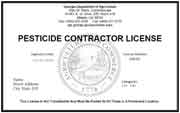 Become
a Licensed Pesticide Applicator. In
many north Georgia counties within the native hemlock range, there is a shortage
of treatment professionals who possess the required Pesticide Contractor License
and have specific knowledge and experience in treating hemlocks. Anyone
who would like more information about how to obtain the necessary license is
invited to call the Hemlock Help Line 706-429-8010. Become
a Licensed Pesticide Applicator. In
many north Georgia counties within the native hemlock range, there is a shortage
of treatment professionals who possess the required Pesticide Contractor License
and have specific knowledge and experience in treating hemlocks. Anyone
who would like more information about how to obtain the necessary license is
invited to call the Hemlock Help Line 706-429-8010.
|

 Please LIKE US on
Facebook.
Please LIKE US on
Facebook.